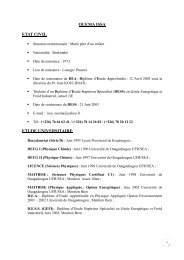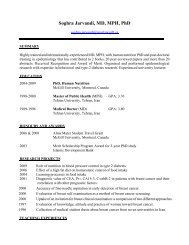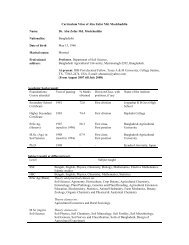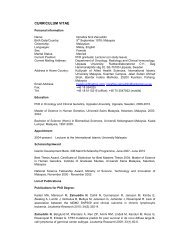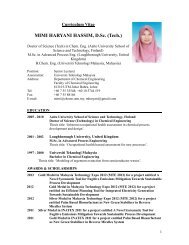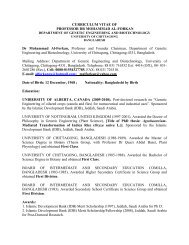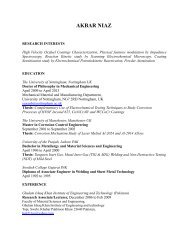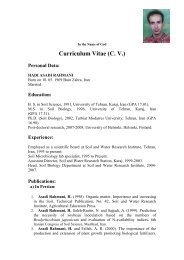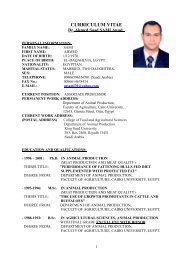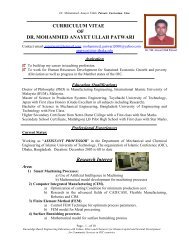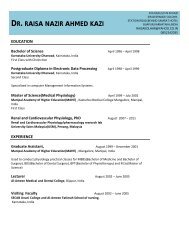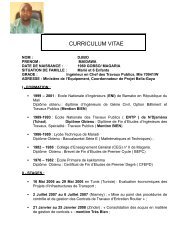Engineering: issues, challenges and opportunities for development ...
Engineering: issues, challenges and opportunities for development ...
Engineering: issues, challenges and opportunities for development ...
Create successful ePaper yourself
Turn your PDF publications into a flip-book with our unique Google optimized e-Paper software.
ENGINEERING: ISSUES CHALLENGES AND OPPORTUNITIES FOR DEVELOPMENT■■■■■discuss in particular the consequences of their proposals<strong>and</strong> actions, direct or indirect, immediate or long term,upon the health of people, social equity <strong>and</strong> the local systemof values;study thoroughly the environment that will be affected,assess all the impacts that might arise in the structure,dynamics <strong>and</strong> aesthetics of the ecosystems involved, urbanizedor natural, as well as in the pertinent socio-economicsystems, <strong>and</strong> select the best alternative <strong>for</strong> <strong>development</strong>that is both environmentally sound <strong>and</strong> sustainable;promote a clear underst<strong>and</strong>ing of the actions required torestore <strong>and</strong>, if possible, to improve the environment thatmay be disturbed, <strong>and</strong> include them in their proposals;reject any kind of commitment that involves unfair damages<strong>for</strong> human surroundings <strong>and</strong> nature, <strong>and</strong> aim <strong>for</strong> thebest possible technical, social, <strong>and</strong> political solution; <strong>and</strong>be aware that the principles of ecosystemic interdependence,diversity maintenance, resource recovery <strong>and</strong> interrelationalharmony <strong>for</strong>m the basis of humankind’s continuedexistence <strong>and</strong> that each of these bases poses a threshold ofsustainability that should not be exceeded.ConclusionAlways remember that war, greed, misery <strong>and</strong> ignorance,plus natural disasters <strong>and</strong> human induced pollution <strong>and</strong>destruction of resources are the main causes of the progressiveimpairment of the environment, <strong>and</strong> that engineers, asactive members of society deeply involved in the promotion of<strong>development</strong>, must use their talent, knowledge <strong>and</strong> imaginationto assist society in removing those evils <strong>and</strong> improving thequality of life <strong>for</strong> all people.Interpretation of the Code of EthicsThe interpretive articles that follow exp<strong>and</strong> on <strong>and</strong> discusssome of the more difficult <strong>and</strong> interrelated components of theCode especially related to the Practice Provisions. No attemptis made to exp<strong>and</strong> on all clauses of the Code, nor is the elaborationpresented on a clause-by-clause basis. The objective ofthis approach is to broaden the interpretation, rather than narrowits focus. The ethics of professional engineering is an integratedwhole <strong>and</strong> cannot be reduced to fixed ‘rules’. There<strong>for</strong>e,the <strong>issues</strong> <strong>and</strong> questions arising from the Code are discussedin a general framework, drawing on any <strong>and</strong> all portions of theCode to demonstrate their inter-relationship <strong>and</strong> to exp<strong>and</strong>on the basic intent of the Code.Sustainable <strong>development</strong> <strong>and</strong> environmentEngineers shall strive to enhance the quality of the biophysical<strong>and</strong> socio-economic urban environment of buildings <strong>and</strong>spaces, <strong>and</strong> to promote the principles of sustainable <strong>development</strong>.Engineers shall seek <strong>opportunities</strong> to work <strong>for</strong> the enhancementof safety, health <strong>and</strong> the social welfare of both their localcommunity <strong>and</strong> the global community through the practiceof sustainable <strong>development</strong>.Engineers whose recommendations are overruled or ignoredon <strong>issues</strong> of safety, health, welfare or sustainable <strong>development</strong>shall in<strong>for</strong>m their contractor or employer of the possible consequences.Protection of the public <strong>and</strong> the environmentProfessional Engineers shall hold paramount the safety, health<strong>and</strong> welfare of the public <strong>and</strong> the protection of the environment.This obligation to the safety, health <strong>and</strong> welfare of thegeneral public, which includes one’s own work environment,is often dependent upon engineering judgements, risk assessments,decisions <strong>and</strong> practices incorporated into structures,machines, products, processes <strong>and</strong> devices. There<strong>for</strong>e, engineersmust control <strong>and</strong> ensure that what they are involved with is incon<strong>for</strong>mity with accepted engineering practice, st<strong>and</strong>ards <strong>and</strong>applicable codes, <strong>and</strong> would be considered safe based on peeradjudication. This responsibility extends to include all <strong>and</strong> anysituation which an engineer encounters <strong>and</strong> includes an obligationto advise the appropriate authority if there is reason tobelieve that any engineering activity, or its products, processes<strong>and</strong> so on, do not con<strong>for</strong>m with the above stated conditions.The meaning of paramount in this basic tenet is that all otherrequirements of the Code are subordinate if protection ofpublic safety, the environment or other substantive publicinterests are involved.Faithful agent of clients <strong>and</strong> employersEngineers shall act as faithful agents or trustees of their clients<strong>and</strong> employers with objectivity, fairness <strong>and</strong> justice to all parties.With respect to the h<strong>and</strong>ling of confidential or proprietaryin<strong>for</strong>mation, the concept of ownership of the in<strong>for</strong>mation<strong>and</strong> protecting that party’s rights is appropriate. Engineersshall not reveal facts, data or in<strong>for</strong>mation obtained in a professionalcapacity without the prior consent of its owner. Theonly exception to respecting confidentially <strong>and</strong> maintaininga trustee’s position is in instances where the public interestor the environment is at risk, as discussed in the precedingsection; but even in these circumstances, the engineer shouldendeavour to have the client <strong>and</strong>/or employer appropriatelyredress the situation, or at least, in the absence of a compellingreason to the contrary, should make every reasonable ef<strong>for</strong>t tocontact them <strong>and</strong> explain clearly the potential risks, prior toin<strong>for</strong>ming the appropriate authority.Professional Engineers shall avoid conflict of interest situationswith employers <strong>and</strong> clients but, should such conflict190



